

Pratical Knowledge Management. Knowledge and Wisdom are my Passion and Work.
Journal of Knowledge Management Practice: Welcome. Since the late 90’s Knowledge Management (KM) has become a dominant force for maximizing enterprise performance and sustainable competitive advantage in the face of our increasingly complex and ambiguous global business environments.
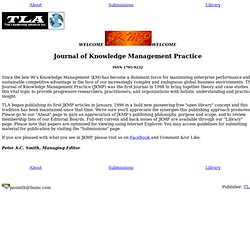
The Journal of Knowledge Management Practice (JKMP) was the first journal in 1998 to bring together theory and case studies in this vital topic to provide progressive researchers, practitioners, and organizations with holistic understanding and practical insight. TLA began publishing its first JKMP articles in January, 1998 in a bold new pioneering free "open library" concept and this tradition has been maintained since that time.
We're sure you'll appreciate the synergies this publishing approach promotes. Please go to our "About" page to gain an appreciation of JKMP’s publishing philosophy, purpose and scope, and to review membership lists of our Editorial Boards. Full-text current and back issues of JKMP are available through our "Library" page. Personal knowledge management, filtering and information overload. With more than 100 million distinct websites, one trillion unique URLs and an ever-increasing amount of e-mail, people are drowning in information.
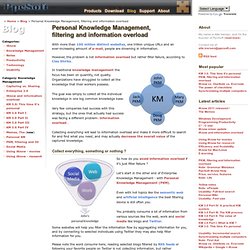
However, the problem is not information overload but rather filter failure, according to Clay Shirky. Collecting everything will lead to information overload and make it more difficult to search for and find what you need, and may actually decrease the overall value of the captured knowledge. Collect everything, something or nothing ? Some websites will help you filter the information flow by aggragating information for you, and by connecting to selected individuals using Twitter they may also help filter information for you. Please note the word consume here; reading selected blogs filtered by RSS feeds or following your favorite people on Twitter is not collecting information, but rather consuming information. The main difference is that a month later when you need to check that link that Mrs. ShareThis. Complexity: Mapping Knowledge Management. We’re posting this to help illustrate the complexities of KM as an activity.
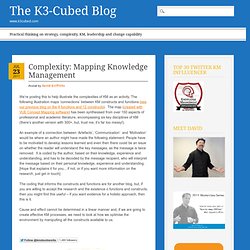
The following illustration maps ‘connections’ between KM constructs and functions (see our previous blog on the 4 functions and 12 constructs). The map (created with VUE Concept Mapping software) has been synthesised from over 150 aspects of professional and academic literature, encompassing six key disciplines of KM (there’s another version with 300+, but, trust me, it’s far too messy!). The coding that informs the constructs and functions are for another blog, but, if you are willing to accept the research and the existence o functions and constructs, then you might find this useful – if you want evidence for a holistic approach, then this is it. Cause and effect cannot be determined in a linear manner and, if we are going to create effective KM processes, we need to look at how we optimise the environment by manipulting all the constructs available to us.
Please, take the time to share... Leadership and Knowledge Management. By Mike Myatt, Chief Strategy Officer, N2growth It’s one thing to possess knowledge, but it’s quite another thing to leverage it.
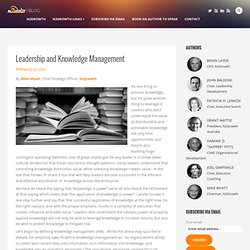
Leaders who don’t understand the value of distributable and actionable knowledge not only limit opportunities, but they’re also building huge contingent operating liabilities. One of great challenges for any leader is to break down cultural tendencies that foster silo-centric thought patterns. Are Blogs Useful in a Knowledge Management System? In the current world of knowledge management, blogs are not exactly the most cutting-edge tool, and for this reason they have never gained widespread use.
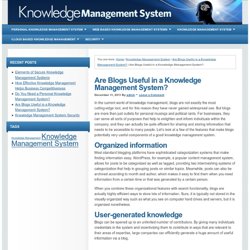
But blogs are more than just outlets for personal musings and political rants. For businesses, they can serve all sorts of purposes that help to enlighten and inform individuals within the company, and they can actually be quite efficient for sharing and storing information that needs to be accessible to many people. Let’s look at a few of the features that make blogs potentially very useful components of a good knowledge management system.
Organized information Most standard blogging platforms have sophisticated categorization systems that make finding information easy. When you combine these organizational features with search functionality, blogs are actually highly efficient ways to store lots of information. User-generated knowledge Blogs can be opened up to an unlimited number of contributors. Internal-external connectivity. KM Consulting. Blog: Knowledge Management. If you have been following TFPL, and know us as a niche provider of Knowledge and Information Management skillsets, please allow me to introduce Progility Recruitment, differentiated from the main TFPL Recruitment service as a new offering.
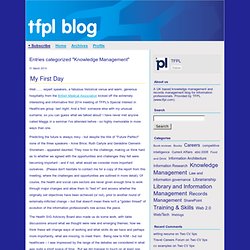
As it is a new offering, and you are a friend of TFPL, we’d really appreciate some help in spreading the word. Please do follow us, and like us... Progility Recruitment compliments TFPL’s expertise by specialising in search and selection for Project Management and Programme Management specialists as a niche recruitment sector. As you may be aware, TFPL was acquired by the ILX Group in July 2013, the group are experts in Project Management Training. The launch of Progility Recruitment immediately compliments the ILX renowned training business. The ILX Group train approximately 6000 Project Managers a year, so are uniquely placed to support our customers. Blog on quality, knowledge management and collaboration: The Quality Blog. A couple of years ago, one of my colleagues at Vivaldi Software had an annoying problem with his mobile phone connection.
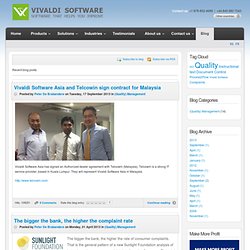
So, in a fit of temporary insanity, he decided to call his Telco’s helpdesk to complete a support ticket. After submitting the ticket, he patiently waited for someone to call back with a solution. However, a few days turned into a week, and then into several weeks. Finally running out of patience, he called the helpdesk again and was told that one of their support engineers had “closed the ticket”.
Not knowing what was happening, he asked the helpdesk operator whether they had found a solution, and what he should do to solve the problem. Knowledge Management: Blog. Social Media versus Knowledge Management - Anthony J. Bradley and Mark P. McDonald. By Anthony J.

Bradley and Mark P. McDonald | 9:27 AM October 26, 2011 On the surface, social media and knowledge management (KM) seem very similar. Both involve people using technology to access information. Both require individuals to create information intended for sharing. But there’s a big difference. KM Blogs & Knols. Blogs are knowledge management tools. Dave Snowden has been hinting at this article for the past week or so, but here it is.
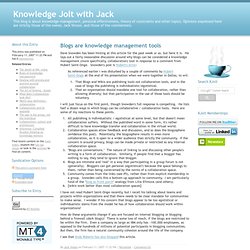
He lays out a fairly reasonable discussion around why blogs can be considered a knowledge management (more specifically, collaboration) tool in response to a comment from Hubert Saint-Onge. Snowden's post is Hubert's error: As referenced earlier I was disturbed by a couple of comments by Hubert Saint-Onge at the end of his presentation when we were together in Dallas, to wit: That Blogs and Wikis are publishing tools not collaboration tools, and in the case of blogs the publishing is individualistic/egotistical.That an organisation should mandate one tool for collaboration, rather than allowing diversity; but that participation in the use of those tools should be voluntary.
I will just focus on the first point, though Snowden's full response is compelling. He lists half a dozen ways in which blogs can be collaborative / collaboration tools. I see that Andy Roberts has also blogged this article. Institute for Innovation and Knowledge Management Blog. Barbara Fillip's Knowledge Management Blog. Blog - Knowledge Management. Knowledge Management Blog.